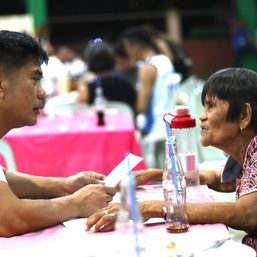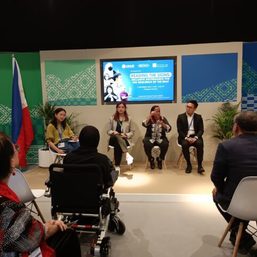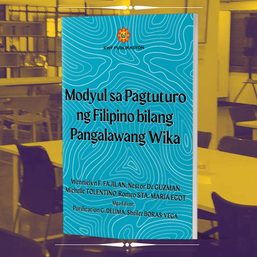SUMMARY
This is AI generated summarization, which may have errors. For context, always refer to the full article.
![[OPINION] To teach English effectively, teach in the mother tongues first](https://www.rappler.com/tachyon/2022/07/ispeak-mother-tongue.jpg)
In the inaugural speech of President Ferdinand “Bongbong” Marcos Jr., he laid out a plan to intensify the Filipinos’ skills in using English, which he said was our skills “which we had and lost.” He also added that this will provide overseas Filipino workers with all the advantages they need to survive and thrive. And until yesterday, in his first State of the Nation Address, he told Congress that he wanted to question the current medium of instruction, which is clearly referring to the use of mother tongues, to make sure that we stayed an English-speaking people.
As we all dream of an improved quality of life, we understand the President’s aspiration to increase Filipinos’ access to various workplaces, which, in his opinion, will come from skill and proficiency in the use of English. However, as he mentioned his plan to question the teaching of the mother tongues, which is in the purview of teachers, may we offer him, as a teacher, a suggestion towards not only maintaining our being English-speaking people but becoming effective and efficient users of the English language: Mr. President, to teach English effectively, teach in the mother tongues first.
Mr. President, the program where the current teaching practice of teaching the mother tongues, both as a subject and as a medium of instruction, is anchored on the Mother Tongue-Based Multilingual Education program. It is based on the principle that a child will learn more effectively if the teaching begins with the concepts he knows and understands, and from this will develop the learning of other concepts and ideas. This includes not only learning English but also learning other local and global languages — as mentioned in the name of the program, it is towards multilingual education — schooling beginning in the mother tongue and transitioning to additional languages. Mr. President, MTB-MLE is a strategy for learners to learn effective use of English.
Mr. President, likened to teaching swimming, where we should teach the fundamental skills first of entering the water, controlling breathing, floating, turning, and exiting, the teaching of the mother tongue will let our learners learn and explore first in their own immediate environment before swimming into the vast world of languages and learning. This agrees with the science of cognitive development that says the development of knowledge, skills, and problem-solving starts when a learner thinks about and understands the world around them — and thinking and understanding for Filipino children, of course, happen first in the language that they know, in their mother tongues. Mr. President, the teaching of the mother tongue follows both common sense and cognitive science.
Mr. President, the Mother Tongue-Based Multilingual Education program is different from the traditional, Filipino-English bilingual method of teaching. In the former method of teaching, learners learn to read in the new language through the practice of memorization. Learners might be able to recognize that the written word “democracy,” for example, means something in English without truly knowing what the meaning of that word is. This way of teaching promotes mechanical thinking rather than fostering a more profound and emotionally satisfying understanding of what it means to express one’s own thoughts and ideas.
Mr. President, I share your aspiration when you said your goal is to provide overseas Filipino workers with all the advantages they need to survive through English. But I do not want them to become overseas Filipino workers who are mechanical thinkers and perform elementary occupations abroad, such as cleaning, restocking supplies, performing basic maintenance in apartments, houses, kitchens, and hotels, and washing cars and windows. Although we recognize the importance of these occupations, we dream of having more professionals or OFWs occupying top positions because they have a better command of English and because they learned English in a systematic, scientific, and learner-centered way and not through mere exposure, memorization, and mechanical thinking. We dream that our OFWs can use English in a way that they can protect themselves against abuses because they have the capacity to detect possible maltreatment done through the use of English, which may not be accessible to them because they were trained to use the kind of English that is for yes-men. Mr. President, MTB-MLE aspires to a higher type of English usage because it was taught efficiently, systematically, and started from where the learners are.
Lastly, Mr. President, the failure of our learners in many international learning assessments is not due to the teaching of mother tongues. First, in the 2018 PISA assessment, you must understand that the takers of the assessment then were 15-year-old students. The mother tongue policy was rolled out nationwide in Grade 1 back in 2012. If Grade 1 pupils are 6-7 years old, by 2018, they are still 12 years old. This means that PISA takers who are 15 years old are not a product of MTB-MLE but of bilingual education in Filipino and English. Second, the countries that topped the 2018 PISA assessment were learners from countries that teach using the home language. They also took the 2018 PISA Assessment in the same language. Meanwhile, the Philippines, apart from teaching in a language that is not the home language or the language best known by the majority of learners, took the 2018 PISA Assessment in English, although it has the choice to choose Filipino or the learner’s home language. Third, the 2018 PISA assessment results report points out not just the language but comments on the government’s budget for the education of each student; gender gap; socio-economic status; school atmosphere; sense of belongingness; lack of growth mindset; behavior; and many others why we failed their assessment.
Clearly, Mr. President, the blame must not be on the teaching of the mother tongues but on the wider and more evasive problem in the educational system. Thus, when you review the educational system, please consider looking into the other reasons our education continuously fails us, because even if language is central and critical to education, language is not the sole reason why we are failing.
Mr. President, as you dream of fostering the Filipino brand to spark our sense of pride and reaffirm our strong sense of identity, please note that Mother Tongue-Based Multilingual Education is a Filipino identity. It is a gift to us by our being people living in a country of many mother tongues and having the capacity to acquire multilingual skills. And as a gift, it is up to us how to use it effectively. – Rappler.com
Leonardo D. Tejano is a teacher in Mariano Marcos State University.
Add a comment
How does this make you feel?
![[ANALYSIS] Code switching or translanguaging — which is better for classrooms?](https://www.rappler.com/tachyon/2021/01/code-switching-v-translanguaging-January-2-2021.jpg?fit=449%2C449)
![[New School] The Filipino-American dilemma: Nasaan ang mga wikang Pilipino?](https://www.rappler.com/tachyon/2022/06/interest-in-writing-june-2-2022-1.jpg?fit=449%2C449)





![[OPINION] Principles in government rightsizing: 5 Es and an A](https://www.rappler.com/tachyon/2022/08/tl-sona-rightsizing.jpg?resize=257%2C257&crop=278px%2C0px%2C720px%2C720px)
![[OPINYON] Ang unang SONA ni BBM vs People’s Agenda](https://www.rappler.com/tachyon/2022/07/tl-sona-people.jpg?resize=257%2C257&crop_strategy=attention)
![[Newspoint] Junior gives us our cake](https://www.rappler.com/tachyon/2022/07/Junior-Cake.jpg?resize=257%2C257&crop=316px%2C0px%2C720px%2C720px)

There are no comments yet. Add your comment to start the conversation.